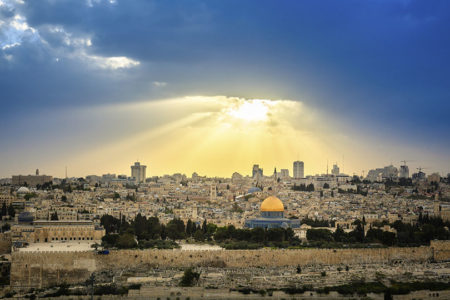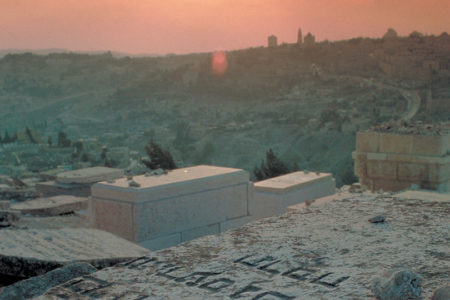When God Comes to Jerusalem Zechariah 14:8-21
In this interconnected world of electronic information, you may be surprised to know that a live camera broadcasts a view of the Ascension Chapel on the Mount of Olives in Jerusalem twenty-four hours a day.
For those familiar with Zechariah 14, this information is quite understandable. The text declares that someday the Lord will return to this identical spot to fight His enemies:
And his feet shall stand in that day upon the Mount of Olives, which is before Jerusalem on the east, and the Mount of Olives shall cleave in its midst toward the east and toward the west (v. 4).
The angels foretold this event after the early disciples watched Jesus ascend into heaven from this very mountain: “This same Jesus, who is taken up from you into heaven, shall so come in like manner as ye have seen him go into heaven” (Acts 1:11). Someday Jesus the Messiah will return bodily to this earth; and the point of contact will be the Mount of Olives, directly east of the Temple Mount in Jerusalem. Zechariah 14:8–21 describes the remarkable transformation that will occur after this glorious event.
God’s Word Interpreted
The words of Zechariah 14 are clear—God will return to Jerusalem, destroy His enemies, establish His Kingdom, and receive worship by His people. These events have never yet happened in history. However, some Christians contend that this prophecy cannot refer to future, literal events. Instead, they spiritualize the promises to say they are fulfilled in today’s church. To them, the church is the “new Israel”; and Christians have replaced the Jewish people in God’s program. Replacement Theology argues that Israel forfeited any future in God’s promises and that the church inherits the promises in a spiritual form:
The general facts predicted are, a wide combination against the Church, a time of trouble ensuing, in the midst of which the Lord appears in terrible power, destroys the enemies of his people, establishes the Church in permanent glory.1
How can this view write off Israel when God has promised never to do so?
Thus saith the LORD, who giveth the sun for a light by day, and the ordinances of the moon and of the stars for a light by night, who divideth the sea when its waves roar; The LORD of hosts is his name: If those ordinances depart from before me, saith the LORD, then the seed of Israel also shall cease from being a nation before me forever (Jer. 31:35–36).
Jesus never denied a future for Israel when His disciples asked, “Lord, wilt thou at this time restore again the kingdom to Israel?” (Acts 1:6). Instead, Jesus responded, “It is not for you to know the times or the seasons, which the Father hath put in his own power” (Acts 1:7). Israel’s future restoration, clearly prophesied in the Old Testament, will occur. When? We do not know. But this event is what Zechariah foretells.
God’s Kingdom Established (vv. 8–11)
After describing the day when the Lord returns to the Mount of Olives (vv. 3–7), the prophet Zechariah stated that “living waters” will flow from Jerusalem in two directions—east toward the Dead Sea and west toward the Mediterranean Sea (v. 8). The prophet Ezekiel added that this river will flow from a rebuilt Temple and that its fresh water will dilute the Dead Sea’s extreme salinity to produce an abundance of fish (Ezek. 47:1–12). This literal flow of spring water also speaks of God’s life-giving physical and spiritual blessings that will flow from His throne on Earth.
These events will occur only when “the LORD shall be king over all the earth” (v. 9), which has been God’s goal since the Garden of Eden. There Adam and Eve rebelled against God’s rule. The kingdom of Israel represented divine rule, but even that regime failed due to many disobedient kings and a sinful nation. Jesus held out the reality of a future and perfect Kingdom when He told His followers to pray, “Thy kingdom come. Thy will be done in earth, as it is in heaven” (Mt. 6:10). His return to this earth, as Zechariah prophesied, will establish His kingly authority from Jerusalem. Human history is ever moving toward that goal when it will finally be said, “The kingdom of this world is become the kingdom of our Lord, and of his Christ, and he shall reign forever and ever” (Rev. 11:15).
The Millennial Kingdom will be marked by the worship of the one true God instead of the worship of many gods, which has always been true in human history: “In that day shall there be one LORD, and his name one” (v. 9). This verse is a clear allusion to the Shemaof Deuteronomy 6:4. In that future day, the triune God, including His Messianic King, will receive all worship when “at the name of Jesus every knee should bow, of things in heaven, and things in earth, and things under the earth, And that every tongue should confess that Jesus Christ is Lord, to the glory of God, the Father” (Phil. 2:10–11).
The prophet provided geographical details of the city where God’s reign will commence. Jerusalem will actually become elevated above the rest of the land that will be leveled: “All the land shall be turned like the Arabah [as a plain] from Geba [in the north] to Rimmon south of Jerusalem; and it [Jerusalem] shall be lifted up” (v. 10). This refashioning of the earth will highlight the importance of the city of the great King as a precious gold ring elevates a more precious gem. The prophets Isaiah and Micah also predicted this great event (Isa. 2:2; Mic. 4:1). God also has promised that in that day, with the people of Israel living in the restored land, His curse of destruction on the land (Mal. 4:6) will be reversed. The land will be “safely inhabited” (v. 11)—certainly the opposite of its past and present conditions.
In spite of a world where a host of gods are worshiped, Christians have firm confidence that someday God Himself will return to this planet that He created to set up an eternal and unrivaled Kingdom. Although some spiritual battles may be lost in our conflict with sin and Satan, the war’s final outcome is already determined: “Werefore, beloved, seeing that ye look for such things, be diligent that ye may be found of him in peace, without spot, and blameless” (2 Pet. 3:14).
God’s Enemies Judged (vv. 12-15)
These verses reflect on verses 1-3, which describe God’s destructive judgment on His enemies who fight against Jerusalem at the Second Coming. Graphic details about this judgment include a type of flesheating plague on both mankind and animals, so “their eyes shall consume away in their holes, and their tongue shall consume away in their mouth” (v. 12; cf. v. 15). God will also cause confusion among His enemies, so they destroy each other (v. 13)-te same miraculous technique He used in past battles with Israel’s enemies (Jud. 7:22; 1 Sam . 14:20; 2 Chr. 20:23; Isa. 19:2).
The Jewish people will fight alongside their God and plunder the treasure of their enemies, just as they received the Egyptians’ goods in the Exodus (v. 14). The New Testament description of this event is recorded in Revelation 19:11-16, where John sees Jesus coming out of heaven on a white horse to “judge and make war” (v. 11). While today we “wrestle not against flesh and blood” (Eph. 6:12), at the end of the age our Savior will put an end to all sin and sinners.
God’s People Worship (vv. 16-21)
In the future Messianic Kingdom, all people living throughout the world will worship God since all unbelievers will perish when Jesus returns to establish that Kingdom. That there will be Gentiles who survive the Tribulation is clear from verse 16: “Every one that is left of all the nations [Hebrew, goyim] which came against Jerusalem shall even go up from year to year to worship the King.”
These Gentiles will not be among the armed forces who die attacking God and the Israelites, as described in verses 2-3. Jesus called these survivors the “sheep” who “inherit the kingdom prepared for you from the foundation of the world” (Mt. 25:34). One example of their regular worship is their annual attendance at Jerusalem’s Temple for the Feast of Tabernacles (Booths). This pilgrimage festival, explained in Leviticus 23:34-36, celebrates the year’s harvest and God’s faithfulness in providing all that His people need. In the Messianic Kingdom it will cause all of God’s people, Jews and Gentiles, to reflect on His goodness to them and His actual “tabernacling,” or dwelling, with mankind on Earth.
To refuse to observe such a God-given ritual will be outright rebellion. Since those who enter the earthly Kingdom will have human bodies capable of sinning, it is no surprise that some Gentiles will rebel. Those who refuse II to worship the King, the LORD of hosts, even upon them shall be no rain” (v. 17). This punishment, also found in the Law (Dt . 28:22-24), will even extend to areas like Egypt that technically do not have regular rainfall. God will use this plague, as He did during Moses’ day, to punish Egypt’s sin. Even in the Millennial Kingdom sin will be present but will be swiftly punished by King Jesus who will reign on David’s throne in Jerusalem. In this way He will “rule them with a rod of iron” (Rev. 2:27; 12:5; 19:15).
The final paragraph summarizes Kingdom life in that day. In a word, it will be “holiness.” In ancient Israel, only the high priest’s turban had the words HOLINESS TO THE LOIW inscribed on a golden plate (Ex. 28:36). But in the future Kingdom, even the bells of common horses will bear that designation. In the same way, ordinary cooking pots will be as holy as altar vessels in God’s Temple. There will be no distinction between secular and sacred-all things will be used for God’s glory.
This principle is annunciated for Christians today in 1 Corinthians: “Whether, therefore, ye eat, or drink, or whatever ye do, do all to the glory of God” (10:31).
Finally, the prophet said, “There shall be no more a Canaanite in the house of the LORD of hosts” (v. 21). Canaanite speaks of the people of the land whose religion and lifestyle were so debased that the Israelites were commanded to exterminate them. It is abbreviated language for those who are “unclean and ungodly.” God’s future Temple (cf. Ezek. 40-48) will never be polluted by those unfit for the Kingdom. Jesus’ prayer will have been answered-the Kingdom will have come; and God’s will done on Earth.
ENDNOTE
- Thomas V. Moore, A Commentary on Zechariah, 1865; reprint, The Bannerof Truth Trust, London, 1958, p. 217.








Have just finished a study of Zechariah. Your commentary was most helpful. Thank you‼️